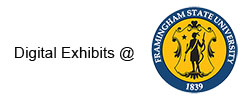-
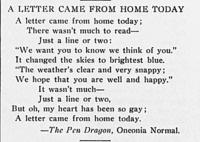
"A LETTER CAME FROM HOME TODAY
A letter came from home today;
There wasn't much to read—
Just a line or two:
“We want you to know we think of you.”
It changed the skies to brightest blue.
“The weather’s clear and very snappy;
We hope that you are well and happy.”
It wasn’t much—
Just a line or two,
But oh, my heart has been so gay;
A letter came from home today.
—The Pen Dragon, Onconia Normal."
-
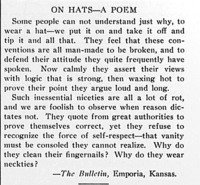
"ON HATS—A POEM
Some people can not understand just why, to wear a hat—we put it on and take it off and tip it and all that. They feel that these conventions are all man-made to be broken, and to defend their attitude they quite frequently have spoken. Now calmly they assert their views with logic that is strong, then waxing hot to prove their point they argue loud and long.
Such inessential niceties arc all a lot of rot, and we arc foolish to observe when reason dictates not. They quote from great authorities to prove themselves correct, yet they refuse to recognize the force of self-respect—that vanity must be consoled they cannot realize. Why do they clean their fingernails? Why do they wear neckties?
—The Bulletin, Emporia, Kansas."
-
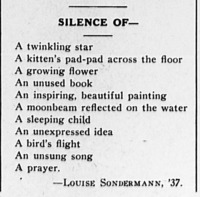
SILENCE OF—
A twinkling star
A kitten’s pad-pad across the floor A growing flower An unused book
An inspiring, beautiful painting
A moonbeam reflected on the water
A sleeping child
An unexpressed idea
A bird’s flight
An unsung song A prayer.
—Louise Sondermann, ’37.
-

"THE GRAY SQUIRREL SPEAKS
Master Josephine’s a black and white cat.
He lives at Crocker where he’s getting very fat.
He is very much spoiled, for he has his own way.
He is growing more conceited every day 1
If you stop for a chat as he sits near the door,
He yawns quite openly and murmurs, "What a bore I”
If you choose to give news of the latest Rat Hunt,
He says, "Can’t be bothered with that kind of stunt 1”
He has his own bed and his very own chair;
You'd think he was a king—such a lordly air!
“Room Service, please,” you ought to hear him call—
Someone always answers at Crocker Hall!
I’m only Gray Squirrel, and 1 don't know it all,
But Grand-dad used to say, “Pride goes before a Fall.”
Now perhaps I am jealous, and with envy insane,
But Master'Josephine—gives me a pain!
—R. H. C."
-
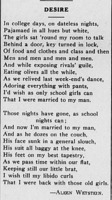
"DESIRE
In college days, on dateless nights, Pajamaed in all hues but white, The girls sat ’round my room to talk Behind a door, key turned in lock, Of food and clothes and class and then Men and men and men and men. And while exposing rivals’ guile, Eating olives all the while, As we relived last week-end's dance, Adoring everything with pants, I’d wish as only school girls can That I were married to my man.
Those nights have gone, as school nights can;
And now I’m married to my man, And as he dozes on the couch, His face sunk in a general slouch, His suit all baggy at the knee, His feet on my best tapestry, As we pass time within our flat, Keeping still our little brat, I wish till my libido curls That I were back with those old girls.
—Aleen Wetstein."
-

"Sons who went to college.
The banker’s son who took up chemistry in search of a universal solvent.
The alphabet soup maker’s son who garnered all the letters from A to F.
The barber's son who dipped a track record.
The butcher’s son who cut classes.
The temperance advocate’s son who took the driest courses.
The telegraph operator’s son who became a dash man."
-
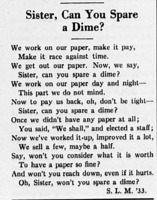
"Sister, Can You Spare a Dime?
We work on our paper, make it pay, Make it race against time.
We get out our paper. Now, we say, Sister, can you spare a dime?
We work on our paper day and night— This |>art we do not mind.
Now to pay us back, oh, don’t be tight— Sister, can you spare a dime?
Once we didn’t have any paper at all;
You said, "We shall," and elected a staff; Now we’ve worked it-up, improved it a lot,
We sell a few, maybe a half.
Say, won't you consider what it is worth To have a paper so fine?
And won't you reach down, even if it hurts.
Oh, Sister, won't you spare a dime?
S. L. M. '33."
-
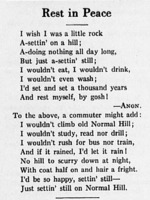
"Rest in Peace
I wish I was a little rock A-settin’ on a hill;
A-doing nothing all day long, But just a-scttin’ still;
I wouldn’t eat, I wouldn’t drink, I wouldn’t even wash;
I’d set and set a thousand years And rest myself, by goshi
—Anon.
To the above, a commuter might add: I wouldn’t climb old Normal Hill;
I wouldn't study, read nor drill;
I wouldn’t rush for bus nor train, And if it rained, I'd let it rain I No hill to scurry down at night, With coat half on and hair a fright. I’d be so happy, settin' still— Just settin’ still on Normal Hill."
-

"“Just take this comfort into your soul In the midst of your worries and frets
The football never could score a goal • Were it not for the kick it gets.”
—John Kendrick Bangs."
-
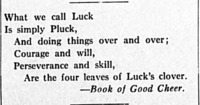
"What we call Luck
Is simply Pluck,
And doing things over and over;
Courage and will,
Perseverance and skill,
Are the four leaves of Luck's clover.
—Book of Good Cheer."
-

"The school paper is a grand invention The school gets all the fame, The printers get all the money, And the staff gets all the blame!
—The Lariat."
-

""They might not need me—yet they might, I’ll let my heart be just in sight.
A smile so small as mine might be Precisely their necessity.”
—Emily Dickinson."
-
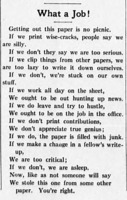
"What a Job!
Getting out this paper is no picnic.
If we print wise-cracks, iwople say we are silly.
If we don’t they say we are too serious.
If we clip things from other papers, we arc too lazy to write it down ourselves.
If we don't, we’re stuck on our own stuff.
If we work all day on the sheet, We ought to be out hunting up news. If we do leave and try to hustle, We ought to be on the job in the office. If we don’t print contributions, We don’t appreciate true genius;
If we do, the paper is filled with junk.
If we make a change in a fellow’s write-up,
We are too critical;
If we don’t, we are asleep.
Now, like as not someone will say We stole this one from some other paper. You’re right."
-
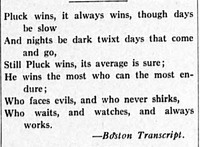
"Pluck wins, it always wins, though days be slow
And nights be dark twixt days that come and go,
Still Pluck wins, its average is sure;
He wins the most who can the most endure ;
Who faces evils, and who never shirks,
Who waits, and watches, and always works.
—Boston Transcript."
-

"The good ship Nausea went to sea With a rollicking crew aboard, With a bosun tight, and a midshipmite
And a lad who was known as Lord;
So they sailed away for a year and a day To the land of the Jcllibo-1ec
Where the Dinkus bird was distinctly heard
Oh the Amfahda tree
They were eight days out on the gallant sloop
And tearing along for fair,
When the Bosun mounted the starboard poop
And he raved and tore his hair;
With a desperate look he waved a book While he told the crew to heed him, And he cried, “What devilish good are yez ?—
Here’s our cook-book crawlin’ with recipes
For hearty lubbers what sail the seas,—■ And none o’ you blokes can read ’em I!
Now what am I to do with the blasted crew
When I don’t know what to feed ’em??”
Then up spoke a lad of about 14 (Who was later to become a distinquish-dcan)
And his voice was shrill but hearty, “I can read, I can cook, I can stand de-bukes,
And my seaweed pie is a dish de luxe, So I’ll cook for the whole durn party!”
And even now in the Sailors’ Rest When the old salts get together
And weave tall tales of adventurous sails Under every sort of weather, You can hear them sigh As they pipe their eye And recall the glories Of seaweed pic;
And their joyfullest stories
Will testify
To the virtues of the spices of Seaweed Pie!
As around the board Each bares his head And thanks the Lord For his daily bread, But thanks Dean Lord With a heartfelt sigh For the nautical bliss Of SEAWEED PIE.
—B. U. News."
-
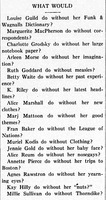
"WHAT WOULD
Louise Guild do without her Funk & Wagnails Dictionary?
Marguerite MacPherson do without correspondents?
Charlotte Grodsky do without her large notebook paper?
Arleen Morse do without her imagination ?
Ruth Goddard do without measles?
Betty Waite do without her past experience?
K. Riley do without her latest headlines?
Alice Marshall do without her new clothes?
Marj Mattoon do without her good themes?
Fran Baker do without the League of Nations?
Muriel Kodis do without Clothing?
Jennie Gold do without her baby face?
Alice Reum do without her nosegays?
Annette Pierce do without her trips to Boston ?
Agnes Rawstron do without her yearning eyes?
Kay Hilly do without her “nuts?”
Millie Sullivan do without Thorndike?"
-
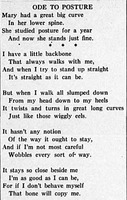
"ODE TO POSTURE
Mary had a great big curve
In her lower spine.
She studied posture for a year
And now she stands just fine.
-
I have a little backbone
That always walks with me,
And when I try to stand up straight
It's straight as it can be.
But when I walk all slumped down
From my head down to my heels
It twists and turns in great long curves
Just like those wiggly eels.
It hasn’t any notion
Of the way it ought to stay,
And if I’m not most careful
Wobbles every sort of- way.
It stays so close beside me
I’m as good as I can be,
For if I don't behave myself
That bone will copy me."
-
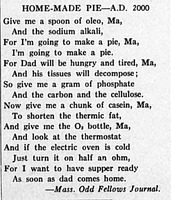
"HOME-MADE PIE—A.D. 2000
Give me a spoon of oleo, Ma,
And the sodium alkali,
For I'm going to make a pie, Ma,
I’m going to make a pie.
For Dad will be hungry and tired, Ma,
And his tissues will decompose;
So give me a gram of phosphate
And the carbon and the cellulose.
Now give me a chunk of casein, Ma,
To shorten the thermic fat,
And give me the O, bottle, Ma,
And look at the thermostat
And if the electric oven is cold
Just turn it on half an ohm,
For I want to have supper ready
As soon as dad comes home.
—Mass. Odd Fellows Journal."
-

"Abraham Lincoln
Ah, some one speaks the name of Lincoln!
And, I, a-dreaming, seem to sec
A silent lad before the firelight,
A worthy book upon his knee.
And now I sec him bravely trudging
O’er rough and dreary miles to school
To satisfy the thirst for knowledge
That kindled in his boyish soul.
With loyalty and patience toiling,
With ever growing strength and mind,
I sec him rise to might and manhood,
Enduring, faithful, just, and kind.
Anri with his patriot’s heart full, dreaming, Although his dreams a cause for jest,
I see him climb to rank of lawyer,
Still striving with unbroken zest.
The years go by. I sec him, hero,
As leader of the nation stand,
His heart in sympathy with freedom
For cv’ry negro in the land.
And now I watch him through the battle
That freed, at length, the hampered slave,
Anri sec the tragedy that sent him
So true a martyr to his grave.
As Liberator—then I hail him—
Who from a meager boyhood came,
Anri rose, triumphant over hardships
To rest in honor and in fame!
Alice Jeannette Ward."
-
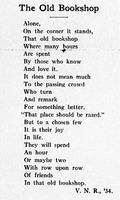
"The Old Bookshop
Alone,
On the corner it stands,
That old bookshop
Where many hours
Are spent
By those who know
And love it.
It does not mean much
To the passing crowd
Who turn
And remark
For something better.
“That place should be razed."
But to a chosen few
It is their joy In life.
They will spend
An hour
Or maybe two
With row upon row
Of friends
In that old bookshop.
V. N. R. '34."
-
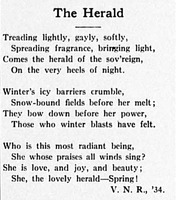
"The Herald
Treading lightly, gayly, softly,
Spreading fragrance, bringing light,
Comes the herald of the sov'reign,
On the very heels of night.
Winter’s icy barriers crumble,
Snow-bound fields before her melt;
They bow down before her power,
Those who winter blasts have felt.
Who is this most radiant being,
She whose praises all winds sing?
She is love, and joy, and beauty;
She, the lovely herald—Spring!
V. N. R. '34."
-
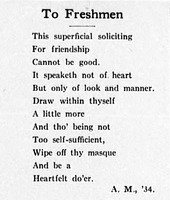
"To Freshmen
This superficial soliciting
For friendship
Cannot be good.
It speaketh not of heart
But only of look and manner.
Draw within thyself
A little more
And tho' being not
Too self-sufficient,
Wipe off thy masque
And be a Heartfelt do'er.
A. M., '34."
-
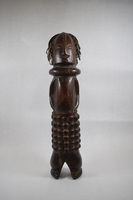
Standing figure with a large head, ringed neck, long torso, short legs, and large feet. The head shows a stylized coiffure with hanging aluminum rings, simple facial features, and a notched nose as well as incised scarification. The upper torso shows incised scarification and arms and hands are held close to the body. The lower torso is composed of multi-protrusions simulating a dress or a costume. The figure is carved from dense hardwood, is stained, and is highly patinated. A cord with beads encircles the figure.
-
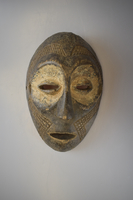
Face mask with raised eyebrows, small, stylized ears, and a wide-open mouth. The mask displays extensive incised scarification on the forehead and cheeks. The entire mask is coated with an encrusted patina and the areas around the eyes show discolored white kaolin.
-
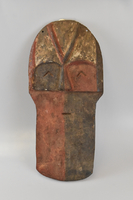
Flat-panel mask with a raised upper section showing a carved v-shaped coiffure, incised reverse V-shaped eyes, and a wide nose. The lower section of the panel shows an incised small horizontal mouth. The mask which was hung in a shrine is painted with dark red and black areas of pigment. There are also traces of white paint.

























